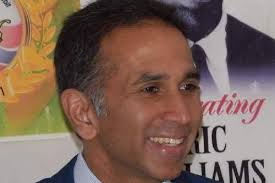Trinidad and Tobago’s Attorney General (AG) Faris Al-Rawi on Wednesday emphasised that Guyana’s implementation of and compliance with anti-money laundering and the countering the financing of terrorism recommendations are critical in light of the expected development of its oil sector, which is projected to see revenues from 2020.
“Guyana is about to take the ascendancy in a lot of oil and gas reserves, in a lot business opportunities and it is, therefore, most critical at this juncture for this work to be done and your Attorney General is leading the way on that path” Al-Rawi said.
Speaking as the immediate past Chairman of the Caribbean Financial Action Task Force (CFATF) during a press conference at the Georgetown Marriott, which followed the opening ceremony of CFATF-GAFIC’s XLVI plenary working group meeting, Al-Rawi pointed to evidence of the contribution of porous borders to terrorism.
Both current and past governments have long complained about the capacity of the military in securing its long stretches of porous borders, particularly those shared with Brazil and Venezuela.
Al-Rawi noted that the securing of the borders should be addressed swiftly.
“All of us need to consider what our position looks like, particularly countries like Guyana that are now coming into proven reserves that are significant in an oil and gas context,” he said, while noting that the situation that exists in Trinidad can easily find its way into other jurisdictions. “We must be eternally vigilant and proactive and there must be no room for tolerance of terrorism or radicalism and we take that extremely seriously in Trinidad and Tobago,” he added.
And using his own country as an example, Al-Rawi noted there are foreign oil companies that have massive developments in Trinidad and therefore any change has a ripple effect globally. “So we are taking this business very seriously. We have taken it on a jurisdictional law basis, prosecutions in the court, strict intelligence cooperation and active boots on the ground and we have had a significant amount of success. No jurisdiction is immune from this,” he posited.
Noting that his country has come to international attention for the supply of foreign terrorist fighters, he said that Trinidad has taken to court individuals who are publicly “masquerading themselves as members of terrorist entities.” He boasted that the country’s no nonsense stance on terrorism activities has seen the prosecution, conviction and forfeiture of assets of those persons found guilty of and/or linked to such crimes. “So we’ve taken judicial action against this. In fact, what we did was to bring to life our terrorism laws,” he said, while noting that the country has been able to develop a significant matrix of coordination with international partners, including the British, the Americans , the Dutch, Suriname, Guyana, and Venezuela, among others.
He made it clear that while the country has found no evidence of finances entering Trinidad from ISIS-connected countries, several targets are being worked on. He said that in this regard, there is a coordinated arrangement between Suriname and Trinidad, in particular. Al-Rawi stated that his country is engaged in daily conversations with several organisations, including the FBI, CIA and British intelligence.
And apart from crime and security, Al-Rawi noted that there is also the risk of de banking and de risking, which revolves around respective banks halting business and transactions of persons in society that are red-flagged because of various reasons. “So this is no small work. This is very important to people of each of our countries,” he said.
Although participants are barred for discussing extensively what discussions are had during the plenary and work group meetings, broad areas pertain to the mutual evaluation process. He said that the “bugging issues” in reports were also discussed, although he did not list them.





